A generous curation of digital and analog writing, game design, ideas, pedagogies, practices, and other projects. Please contact me for more information.
Designing & Making
Here are a few games and designs I have created, published, and played over the years:
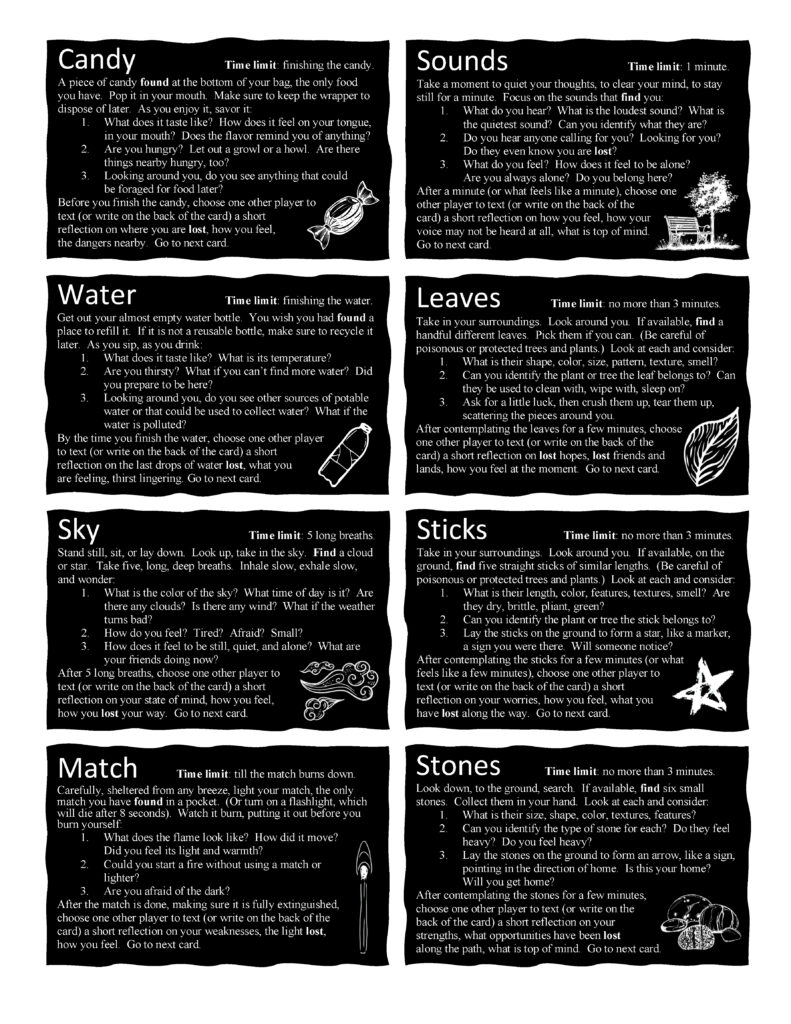
- LOSTFOUND, a freeform LARP about getting lost in and one’s relationship to nature, a Winner of the 2024 Golden Cobra Challenge.
- The Secret Lives of Junk(kin) Drawers, or, Why Marie Kondo Does(n’t) Spork Joy, a freeform LARP about sorting through junk drawers, which earned an Honorable Mention in the 2023 Golden Cobra Challenge.
- After the Comet, a freeform LARP based on W.E.B. Du Bois’s short story “The Comet,” designed for my ENG 1100: “Literature as LARP as Literature” course in Spring 2023 at Ohio University.
- “Why are the Digital Humanities So Straight?,” an essay-as-code-as-text-game is written and published as a BASIC program in Alternative Historiographies of the Digital Humanities published by Punctum in 2021 and edited by Dorothy Kim and Adeline Koh. In 2022, “Why Are the Digital Humanities So Straight?” was selected to be part of the Electronic Literature Organization’s Electronic Literature Collection Volume 4, which includes a playthrough video, code file, and directions for play.
- Wingtopia, an augmented reality game/live-action role-playing game for the “Asian American Arcade” exhibit at the Wing Luke Museum in Seattle, WA, which opened in February 2012.
- Tellings is a point-based, skills-based tabletop RPG, featuring a robust character creation, 100+ skills, 75+ character strengths and weaknesses, a distinct magic and prayer system, and unique fluid-time combat mechanics. Tellings is available via Amazon. A Tellings worldbook is currently in development.
- Archaea Live-Action Role-Playing and Wargaming is an independent medieval, high fantasy live-action role-playing and padded-weapon wargaming (LARP/W) game system (also available via Amazon).
- Currently in development is Archaea: Bane, what I describe as a semi-autopoetic, cooperative card game based in the world of Archaea. Here is my initial thoughts and prototype of the game; an update on the cards design; and a brand new version of the game!
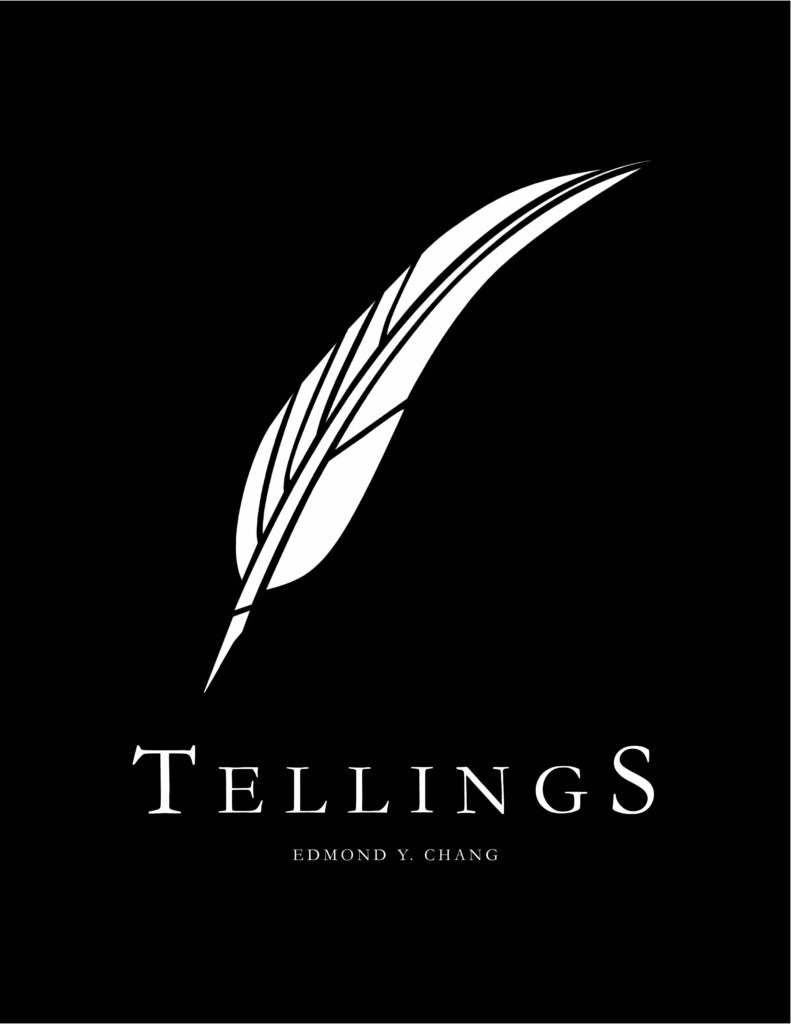
Writing, Editing, & Curating
Here are a few online and multimodal essays and projects I have written, curated, designed (see my CV for a full list of my publications):
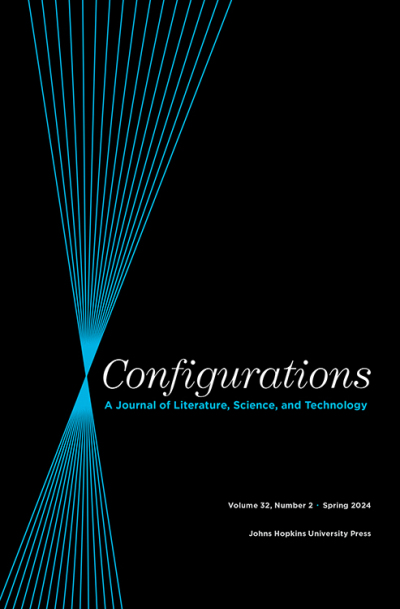
- Edited a special issue of Analog Game Studies 12.2 (July 2025) on “Queer Analog Game Studies,” which included four essays and an introduction entitled “Be Queer, Do Games: Introduction to Queer Analog Game Studies.”
- Edited a special game studies-themed issue of Configurations 36.2 (Spring 2024) with Ashlee Bird, which was the first of its kind for the journal. The issue featured eight essays and an introduction co-authored by Bird and myself.
- Serve as incoming Editor-in-Chief for Analog Game Studies (AGS), a journal dedicated to the academic and popular study of games containing a substantial analog component.
- I am a Contributing Editor of Gamers with Glasses, website of scholars, developers, designers, and gamers.
- I have written a number of short pieces for In Media Res, A Media Commons Project.
- I wrote the keyword “Queer” for the Modern Language Association’s Digital Pedagogy in the Humanities: Concepts, Models, and Experiments: https://digitalpedagogy.hcommons.org/keyword/Queer.
- “Cards Against Humanity is __________” appears in the online journal First Person Scholar, March 2015.
- “Gaming as Writing, Or, World of Warcraft as World of Wordcraft” is a multimodal essay published in August/September 2008 for Computers and Composition Online‘s special issue on “Reading Games: Composition, Literacy, and Video Gaming.”
Teaching & Pedagogy
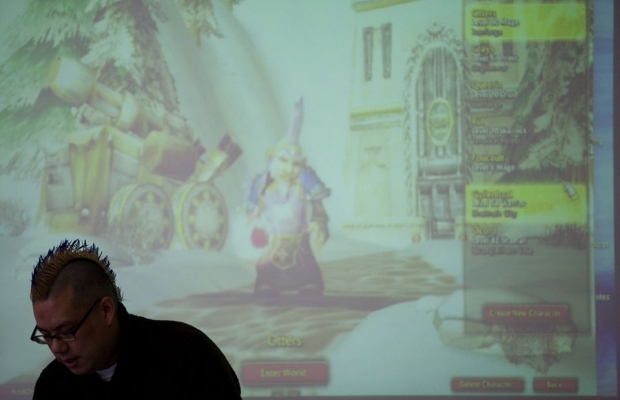

Teaching Awards
- University Professor Award, Nominated and Awarded by Students for Outstanding Teaching, Office of the Provost, OHIO, 2024-25.
- Outstanding WGSS Affiliate Faculty, Certificate of Appreciation, Women’s, Gender, and Sexuality Studies, OHIO, 2023 & 2024.
- Chairs & Directors Emerging Faculty Leadership Award, Office of the Provost, OHIO, 2023.
- LGBTQIA+ Distinguished Faculty Award, University of Oregon Lesbian, Gay, Bisexual, and Transgender Educational Support Services, 2016.
- UW Excellence in Teaching Award, University of Washington Teaching Academy, 2009.
Sample Video Game Studies Courses
- ENG 3850: Writing About Culture and Society: “Critical Approaches to Virtual Worlds & Video Games” | Autumn 2018
- ENG 5930: Independent Reading: “Introduction to Queer Game Studies” | Autumn 2018 | Graduate Course
- CHID496F: Focus Group: “Why So Serious?: Video Games as Persuasion, Politics, and Propaganda” | Co-Taught with Timothy Welsh | Winter 2010
- CHID496F: Focus Group: “Close Playing, or, Bioshock as Practicum” | Co-Taught with Timothy Welsh | Winter 2011
- CHID496F: Focus Group: “Video+Games+Other+Media” | Co-Taught with Sarah Kremen-Hicks | Winter 2012
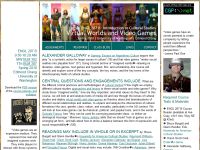
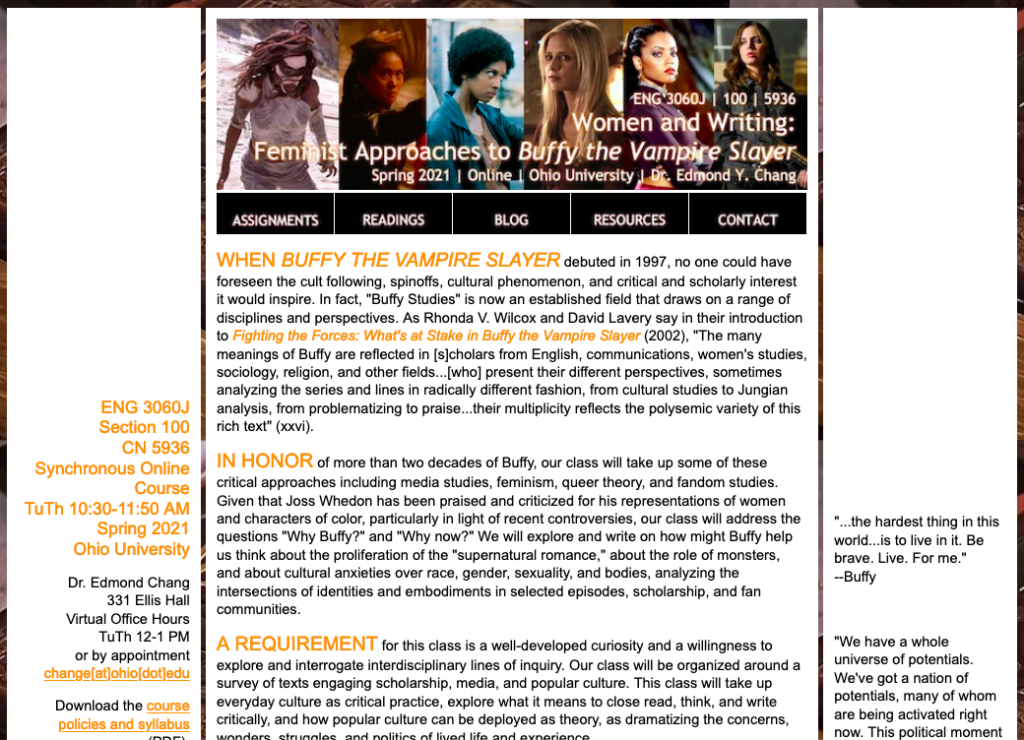
Sample Media Studies Courses
- ENG 3060J: Women and Writing: “Feminist Approaches to Buffy the Vampire Slayer” | Spring 2021 | Online
- ENG 3970T*: Specialized Tutorial: “Electronic Literature, Digital Narratives,” Kayla McGinnis (English, Honors Tutorial College) | Autumn 2019
- ENGL110D: Introduction to Media Studies | Spring 2015
- CHID480F: Special Topics: “Mediating Identites: Technologies of the Self” | Spring 2012
- ENGL111: Composition with Literature Courses on New Media, including: “Imagining Cyberspace” and “Everyday Media: Reading, Writing, and Critiquing“
Invited Talks, Workshops, & Presentations
Here is a selection of talks, demonstrations, and presentations I have given in person and online (see my CV for a full list of my presentations):
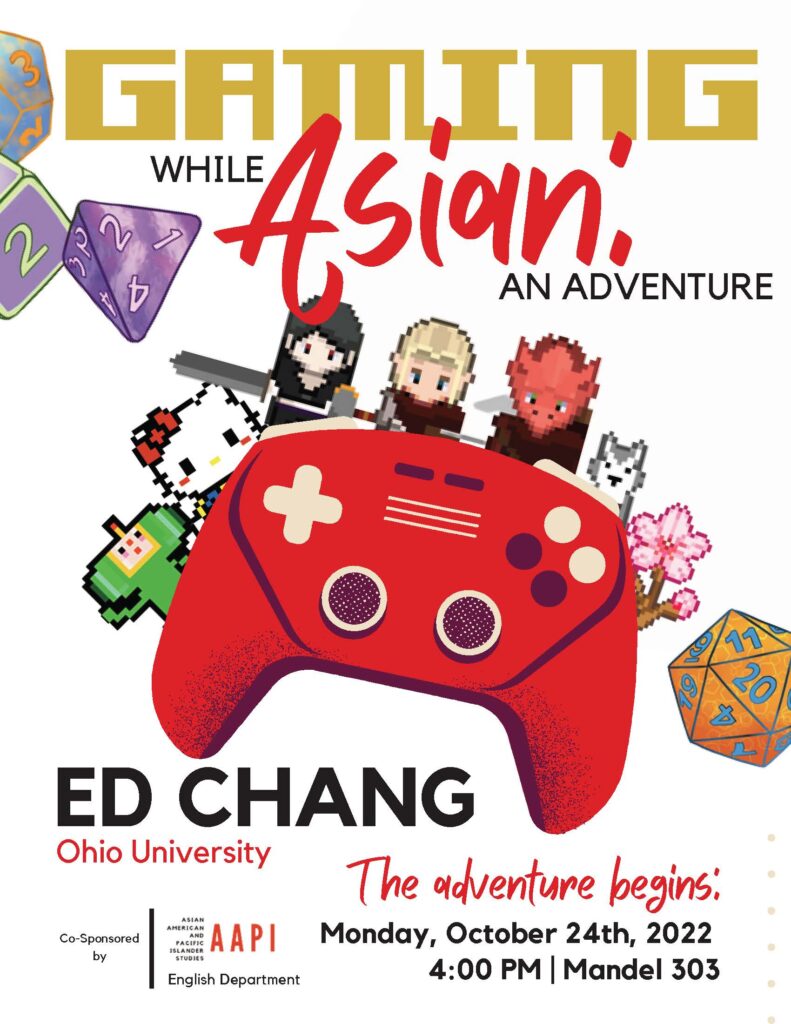
- “Humanities at Play: LIM with Edmond Chang,” invited speaker, Nevada Humanities, July 30, 2024, online.
- “Code/Queer Games/Technonormativity,” keynote, Unlink(ed): Electronic Literature Organization (ELO) conference, July 19, 2024, online.
- “Queer Representations of AI,” invited speaker, part of the “On Hallucinations, Spark(l)ing Intelligence and the Apocalypse: Representation(s) of AI” speaker series, Digital Humanities Research Hub, School of Advanced Study, University of London, March 13, 2024, online.
- “Alan, Ada, Purna: Why are the Digital Humanities So Straight?,” Institute Lecture as part of the Digital Humanities Summer Institute (DHSI), University of Victoria, BC, June 14, 2023, online.
- “Brown Skins, White Avatars: Racebending and Straightwashing in Digital Games.” Invited talk. Part of the UCSB Multicultural Center’s Race Matters Series, UC Santa Barbara, Santa Barbara, CA, January 26, 2016.
- “Towards a (New) Video Game Pedagogy: Critical Players and Gameful Assignments.” Invited workshop. For the Digital Pedagogy Workshops and Digital Currents series, Institute for the Humanities, University of Michigan, Ann Arbor, MI, January 16, 2015.
- “Queer (Im)Possibility and Straightwashing in Digital Games.” Invited talk. Part of the Five College Digital Humanities Speaker Series, Smith College, Northampton, MA, November 21, 2014.
- “The Seductions of Gamification.” Invited workshop and keynote address. Boise State THATCamp, Boise State University, October 2012.
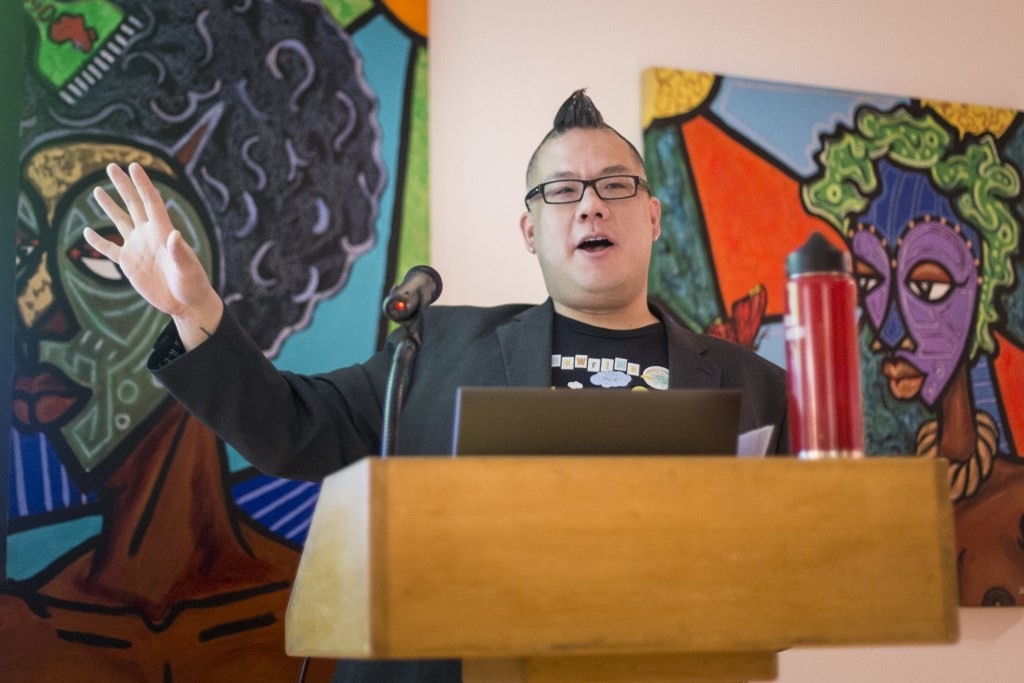
For other sections of my portfolio, go to: